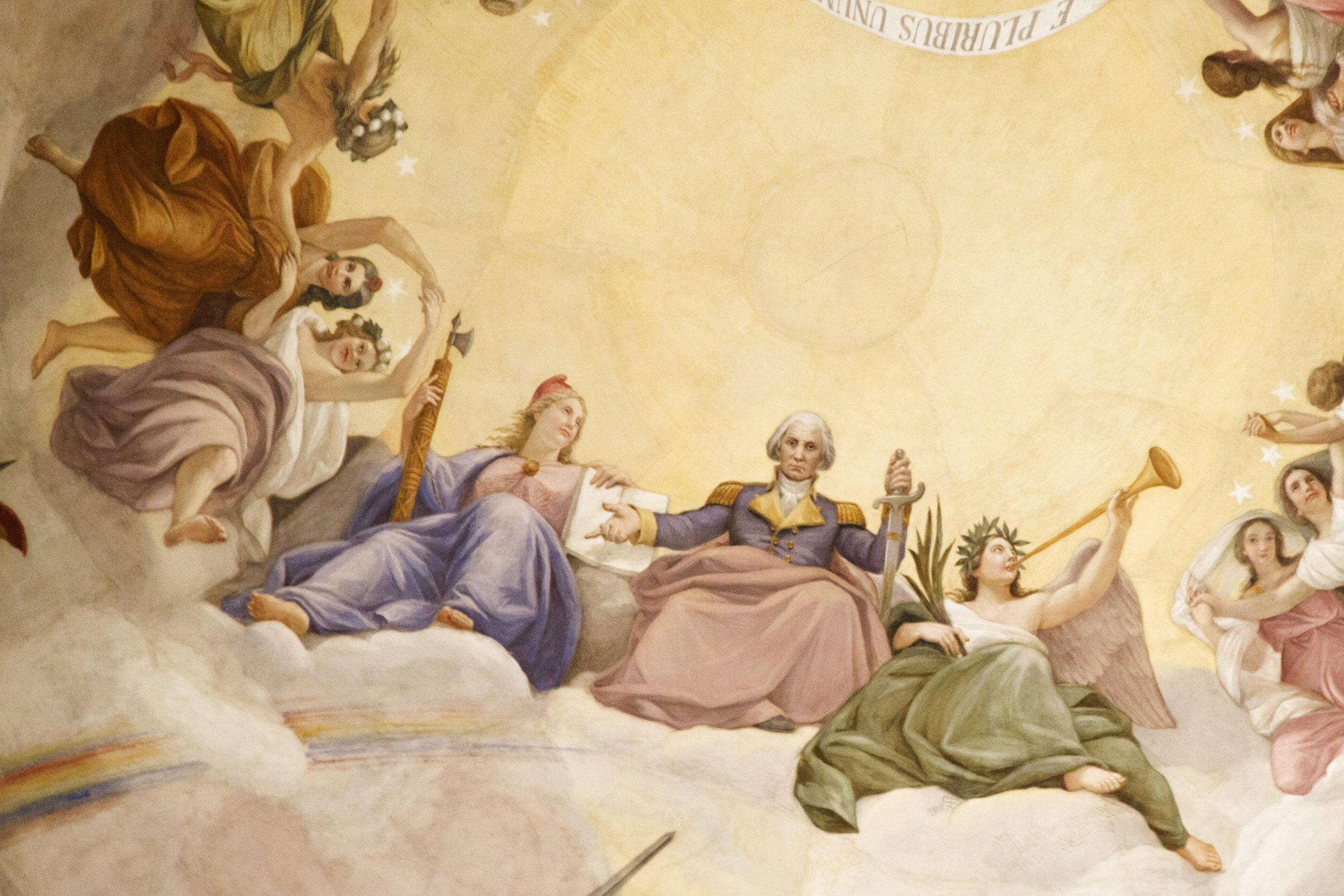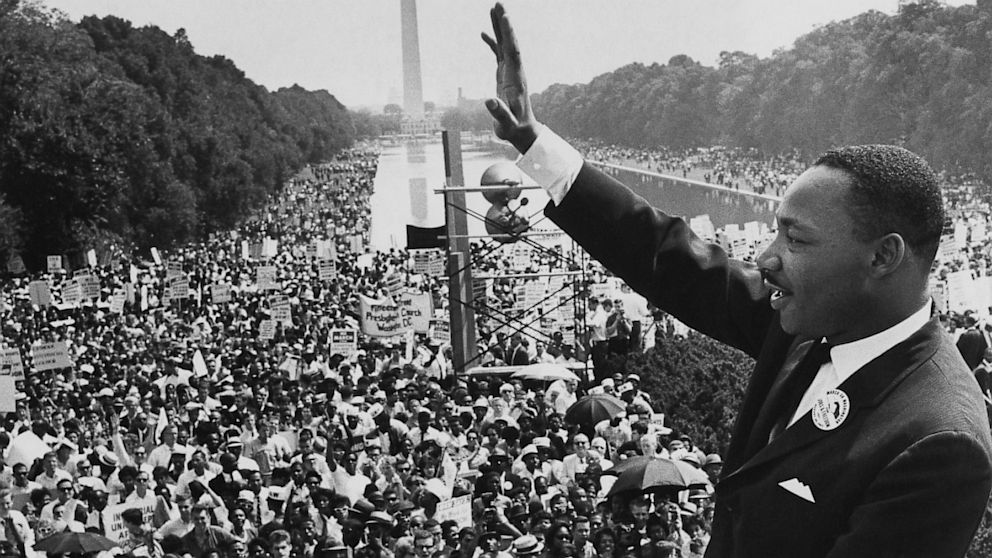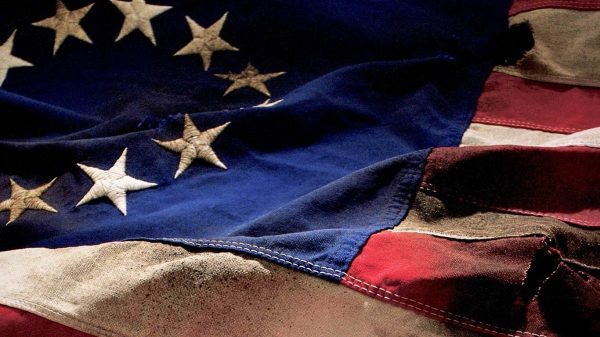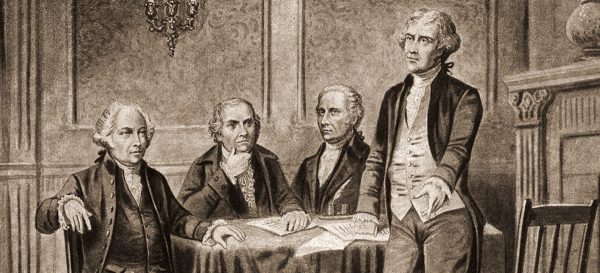Election 2020 is a choice between the America of the Founding and an America beset with guilt.
Soul of Freedom

Washington’s “Letter to the Hebrew Congregation at Newport” spoke to the whole world.
Every summer, the oldest synagogue in America—Touro Synagogue in Newport, Rhode Island—holds a public reading of a letter written by George Washington to the congregation early in his first term as the first President of the United States. The letter, dated August 18, 1790, ranks high among the documents affirming and defining the unprecedented American experiment in religious freedom.
As John Adams insisted at the time, the American Revolution was above all a revolution of ideas. The idea of religious liberty—that all men by nature possess the right to worship God according to the dictates of their own consciences—might be called the soul of that Revolution.
In August 1790, three months after Rhode Island had belatedly ratified the Constitution, President Washington honored the new member of the Union with a visit to Newport, accompanied by his Secretary of State Thomas Jefferson and other dignitaries. As was customary on such occasions, representatives from local religious denominations and civic and business groups read letters of welcome to the President. Washington’s response to the letter from the local Jewish congregation became the historic document that is still read every year in Touro Synagogue.
This Letter to the Hebrew Congregation at Newport was not just meant for local consumption. Washington used his unrivalled moral and political authority to speak to the whole country and the world, to the present and all future time, about the idea of religious liberty that gave transcendent glory to the American Revolution. His letter was published widely in newspapers at the time, frequently reprinted afterwards, and would be quoted in thousands of books over the next two centuries. Here is some of what he said:
The citizens of the United States of America have a right to applaud themselves for having given to mankind examples of an enlarged and liberal policy—a policy worthy of imitation. All possess alike liberty of conscience and immunities of citizenship.
It is now no more that toleration is spoken of as if it were the indulgence of one class of people that another enjoyed the exercise of their inherent natural rights, for, happily, the Government of the United States, which gives to bigotry no sanction, to persecution no assistance, requires only that they who live under its protection should demean themselves as good citizens in giving it on all occasions their effectual support.
The letter concluded with familiar language from the King James version of the Bible:
May the children of the stock of Abraham who dwell in this land continue to merit and enjoy the good will of the other inhabitants—while every one shall sit in safety under his own vine and fig tree and there shall be none to make him afraid.
May the father of all mercies scatter light, and not darkness, upon our paths, and make us all in our several vocations useful here, and in His own due time and way everlastingly happy.
Washington understood well the historic significance of recognizing America’s Jews, not as a “tolerated” minority, but as full citizens with all the “inherent natural rights” enjoyed by every citizen as equal human beings. This recognition, coming over the signature of the great George Washington, father of his country, and first President, was an epochal milestone in the American revolution in religious and political freedom. Just a few years before, the Virginia General Assembly had passed into law the Virginia Statute for Religious Freedom, drafted by Thomas Jefferson and considered by him to be an accomplishment ranking with his authorship of the Declaration of Independence. A little more than a year after Washington wrote his letter, the first 10 amendments to the Constitution were ratified, becoming what we know as our Bill of Rights. The first amendment, of course, begins: “Congress shall make no law respecting an establishment of religion, or prohibiting the free exercise thereof.” In the decades after 1790, the idea of religious liberty continued to make its way into the minds of Americans and the laws and institutions of the states.
The effects of these developments were noted not quite a half century later by that great observer of American realities, the Frenchman Alexis de Tocqueville. When he arrived in America in the 1830s, one of the first things he noticed was how the spirit of religion and the spirit of liberty were intimately united in America and how inseparable American political freedom is from religious freedom. Only a few years after Tocqueville’s visit, the 28-year-old Abraham Lincoln summed up the great legacy of freedom bequeathed by “our fathers” to their posterity: “We [now] find ourselves,” he said, “under the government of a system of political institutions, conducing more essentially to the ends of civil and religious liberty, than any of which the history of former Times tells us.” Our great task, and great honor, Lincoln said, must be to perpetuate this inheritance of freedom.
The central idea of the American Revolution, as proclaimed in the Virginia Statute for Religious Freedom, is that “Almighty God hath created the mind free.” Only because the human mind is free to grasp the truth that all men are created equal can the just powers of government be derived from the consent of the governed. And only under a government acknowledging and respecting this freedom of the mind to be determined by the truth can citizens, worshipping as their consciences dictate, do their duty to God. Lincoln was right that the history of former times tells us of no such government before 1776. This is why Washington wanted the citizens of America—in every generation—to hear from him that they have a right to applaud themselves for setting an example “worthy of imitation” by all mankind.
The American Mind presents a range of perspectives. Views are writers’ own and do not necessarily represent those of The Claremont Institute.
The American Mind is a publication of the Claremont Institute, a non-profit 501(c)(3) organization, dedicated to restoring the principles of the American Founding to their rightful, preeminent authority in our national life. Interested in supporting our work? Gifts to the Claremont Institute are tax-deductible.
In 2020, Americans must decide whether their country is worthy of praise or contempt.
Martin Luther King, Jr.’s “I Have a Dream” speech casts a golden thread across three centuries, connecting us to the source of the American dream.
In 2020, it's equality versus chaos.
A response to Christopher Flannery.
There is no room for quietism in our contentious politics.





